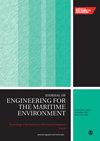Waste heat recovery assessment of triple heat-exchanger usage for ship main engine pre-heating and fresh water generation systems
IF 1.5
4区 工程技术
Q3 ENGINEERING, MARINE
Proceedings of the Institution of Mechanical Engineers, Part M: Journal of Engineering for the Maritime Environment
Pub Date : 2023-08-30
DOI:10.1177/14750902231194794
引用次数: 0
Abstract
In this study, the applicability, fuel saving and CO2 emission reducing potential of the triple heat-exchanger fed by the diesel generator exhaust gas with and without water steam have been studied for ship’s one and two main engines pre-heating and freshwater generation (FWG) cycles under port conditions with conducting energy and exergy analysis. The performance criteria (PC) and exergy efficiency (ε) values of the main engine pre-heating and freshwater generator systems of the Ro-Ro ship selected for the case study were determined by written Matlab 2021a codes merging CoolProp 6.4.2 database with Python. It was determined that even at the lowest operating load of the diesel generator (25%), the exhaust heat energy would be sufficient to preheat the main engine and generating fresh water with also saving fuel consumption. As a result, during the 12-h port period, each 1 kW heat energy reduction on steam will provide 0.0853 kg/h fuel saving in the boiler. Thus, 273 kg CO2 emission will be reduced for each kW of heat energy to be obtained. Considering the comparatively increased PC and ε values of whole system cycle containing common triple heat-exchanger for two main engines, it can be used conveniently and reliably on ships.船舶主机预热和淡水发电系统三联热交换器余热回收评价
本研究通过进行能量和火用分析,研究了船用一、两台主机预热和淡水发电(FWG)循环在港口工况下柴油机废气有汽和无汽两种工况下的适用性、节油和CO2减排潜力。通过将CoolProp 6.4.2数据库与Python结合编写Matlab 2021a代码,确定了所选滚装船主机预热系统和淡水发电系统的性能标准(PC)和火用效率(ε)值。经确定,即使在柴油发电机最低运行负荷(25%)下,余热也足以预热主机并产生淡水,同时节省燃料消耗。因此,在12h的港口期间,每减少1kw的蒸汽热能,将为锅炉节省0.0853 kg/h的燃料。因此,每获得一千瓦的热能将减少273公斤的二氧化碳排放。考虑到双主机通用三联换热器全系统循环的PC值和ε值相对提高,在船舶上使用方便、可靠。
本文章由计算机程序翻译,如有差异,请以英文原文为准。
求助全文
约1分钟内获得全文
求助全文
来源期刊

CiteScore
3.90
自引率
11.10%
发文量
77
审稿时长
>12 weeks
期刊介绍:
The Journal of Engineering for the Maritime Environment is concerned with the design, production and operation of engineering artefacts for the maritime environment. The journal straddles the traditional boundaries of naval architecture, marine engineering, offshore/ocean engineering, coastal engineering and port engineering.
 求助内容:
求助内容: 应助结果提醒方式:
应助结果提醒方式:


